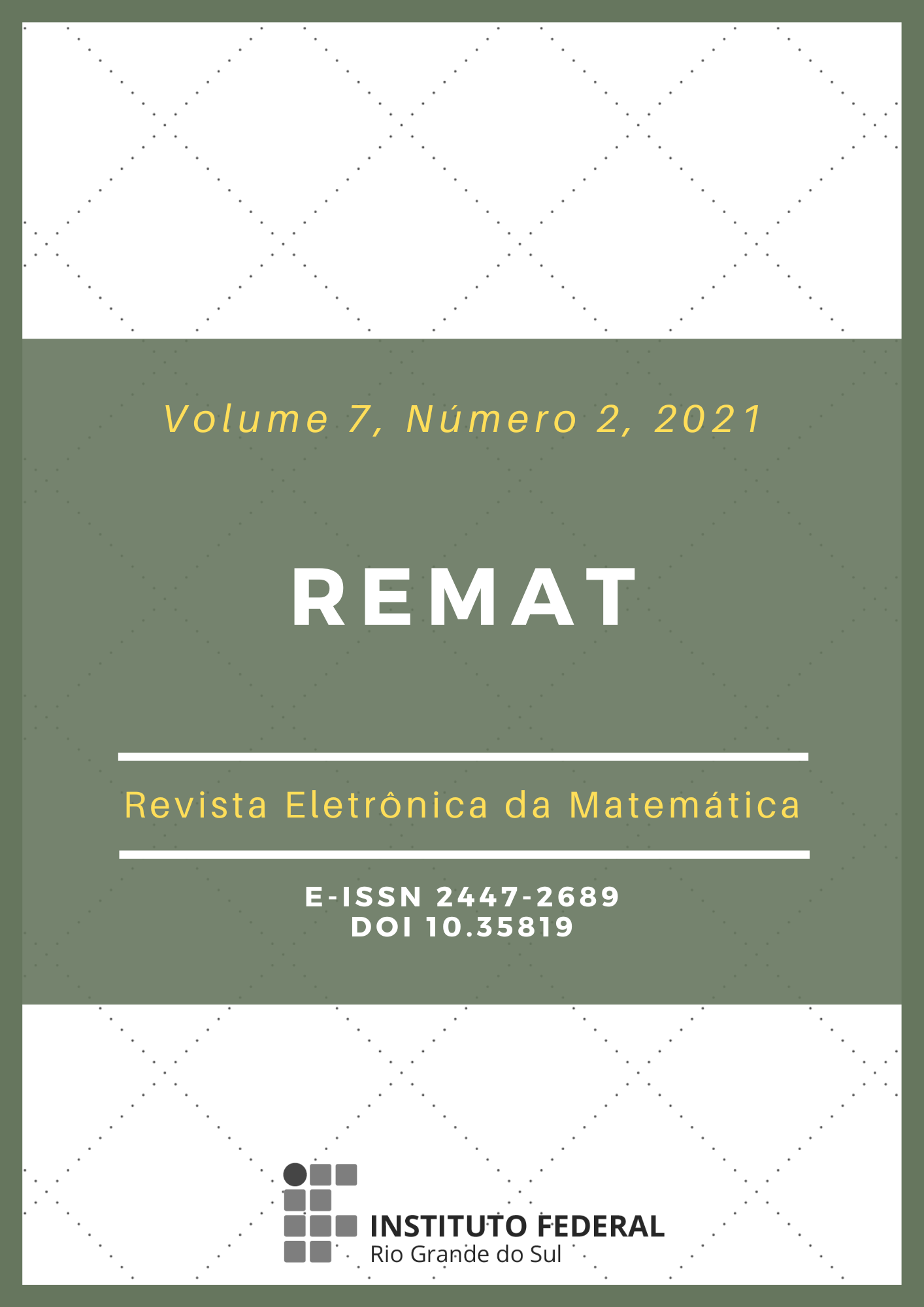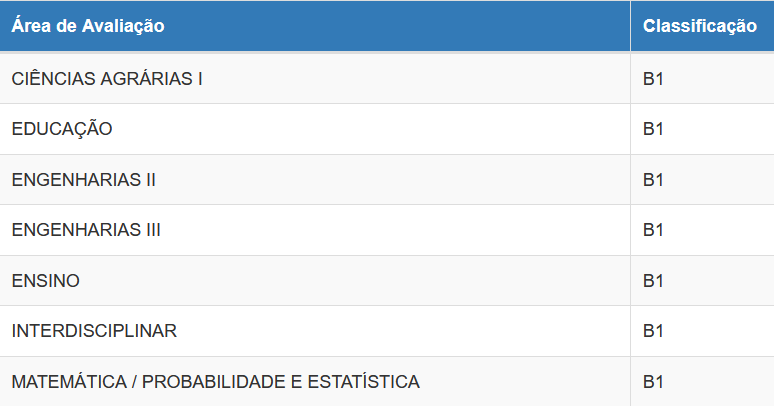Unit fractions: contributions from the History of Mathematics to rational numbers teaching
DOI:
https://doi.org/10.35819/remat2021v7i2id4816Keywords:
unit fractions, History of Mathematics, teaching, ancient egiptiansAbstract
The History of Mathematics is a field that can bring contributions to Mathematics teaching at basic education. The objective of this work was to carry out a historical-epistemological survey on the unit fractions in History of Mathematics books and to analyze the possibilities of contribution of this theme to the final years of Elementary School. Research by Lopes (2008) and Pommer (2020) show that the teaching of rational numbers is still an open subject for academic debates. For this discussion we raised the framework on fractions teaching, as well as the relevance and possible contributions of the field of the History of Mathematics. In the methodological part, a documentary research was developed in four History of Mathematics books: Karlson (1961), Boyer (1974), Ifrah (1997) e Roque 2012. The books revealed moments of the development of unit fractions by the ancient Egyptians that allow a connection with research involving rational numbers in Mathematics Education. Still, it was observed that the cultural contexts involved in the development of unitary fractions by the ancient Egyptian people could be inserted in problematic situations to foster interdisciplinary teaching, which contributes to the learning of the fractions themselves.
Downloads
References
BEHR, M. J; LESH, R.; POST, T.; SILVER, E. Rational number concepts.In: LESH, R.; LANDAU, M. (ed.). Acquisition of mathematics concepts and processes. New York: Academic Press, p. 91-126, 1983.
BERTONI, N. E. Um novo paradigma no ensino e aprendizagem das frações. In: ENCONTRO NACIONAL DE EDUCAÇÃO MATEMÁTICA, 8., 2004, Recife. Anais [...]. Recife: Universidade Federal de Pernanbuco, 2004.
BOYER, C. B. História da Matemática. São Paulo: Edgard Blücher, 1974.
BRASIL. Base Nacional Comum Curricular. Brasília, DF: Ministério da Educação, 2017.
BRASIL. Parâmetros Curriculares Nacionais: Ensino Médio. Brasília: MEC/SEF, 1997.
BRITO JR., J. J. R. T. TDIC gamificada como complemento da construção do conhecimento de fração sob a perspectiva dos subconstrutos. In: EDUCAÇÃO E TECNOLOGIA DIGITAIS EM CENÁRIO DE TRANSIÇÃO: MÚLTIPLOS OLHARES PARA APRENDIZAGEM, 2020, Campo Grande. Anais [...]. v. 2, n. 1, 2020. Disponível em: https://periodicos.ufms.br/index.php/IntegraEaD/article/view/11803. Acesso em: 12. jan. 2021.
BROUSSEAU, G. A cultura matemática é um instrumento para a cidadania. Por Thais Gurgel. Revista Nova Escola, 1 dez. 2009. Disponível em: https://novaescola.org.br/conteudo/545/guy-brousseau-a-cultura-matematica-e-um-instrumento-para-a-cidadania#. Acesso em: 11 fev. 2021.
CORSETTI, B. A análise documental no contexto da metodologia qualitativa: uma abordagem a partir da experiência de pesquisa do Programa de Pós-Graduação em Educação da Unisinos. UNIrevista, v. 1, n. 1, p. 32-46, jan. 2006. Disponível em: http://gephisnop.weebly.com/uploads/2/3/9/6/23969914/a_anlise_documental_no_contexto_da_pesquis_qualitativa.pdf. Acesso em: 9 ago. 2021.
D’AMBROSIO, U. A História da Matemática: questões historiográficas e políticas e reflexos na educação matemática. In: BICUDO, M. A. V. (org.) Pesquisa em Educação Matemática: Concepções & Perspectivas. São Paulo: UNESP, 1999, p. 97-115.
GINZBURG, C. Estranhamento: Pré-história de um procedimento literário. In: GINZBURG, C. Olhos de Madeira: Nove Reflexões sobre a distância. São Paulo: Cia das Letras, 2001.
GUERREIRO, H. G.; SERRAZINA, L.; PONTE, J. P. A percentagem na aprendizagem com compreensão dos números racionais. Zetetiké, Campinas, v. 26, n. 2, p. 354-374, maio/ago., 2018.
IFRAH, G. Os Números: A História de uma grande invenção. 2. ed. Rio de Janeiro: Nova Fronteira, 1997.
KARLSON, P. A Magia dos Números. Rio de Janeiro: Editora Globo, 1961.
KIERAN, T. E. Number and measurement: mathematical, cognitive and instructional fundaments of frational number. OHERIC/SMEA, Columbus, p. 101-144, 1976.
LOPES, A. J. O que nossos alunos podem estar deixando de aprender sobre frações, quando lhes tentamos ensinar frações. Bolema, Rio Claro, v. 21, n. 31, 2008. Disponível em: https://www.periodicos.rc.biblioteca.unesp.br/index.php/bolema/article/view/2102. Acesso em: 9 ago. 2021.
MIGUEL, A. As potencialidades pedagógicas da História da Matemática em questão: argumentos reforçadores e questionadores. Zetetiké, Campinas, v. 5, n. 2, p. 73-106, jul./dez. 1997. DOI: https://doi.org/10.20396/zet.v5i8.8646848, https://doi.org/10.20396/zet.v5i8.8646849.
MIOLA, A. F. S.; LIMA, T. E. A. Conhecimentos necessários para o ensino de números racionais no Ensino Fundamental. Educação Matemática Debate, Montes Claros, MG, v. 4, p. 1-16, 2020. DOI: https://doi.org/10.46551/emd.e202044.
NUNES, T.; BRYANT, P. Crianças fazendo matemática. Porto Alegre: Artmed, 1997.
OLIVEIRA, M. K. Vygotsky: Aprendizado e Desenvolvimento – Um Processo Sócio-Histórico. São Paulo: Scipione, 1993.
PANASUK, R. M.; HORTON, L. B. Integrating History of Mathematics into the Classroom: Was Aristotle Wrong? Journal of Curriculum and Teaching, v. 2, n. 2, p. 37-46, 2013. DOI: https://doi.org/10.5430/jct.v2n2p37.
PEREIRA, T. da S.; ZÚÑIGA, N. O. C. Uma investigação sobre as dificuldades dos alunos das séries iniciais do Ensino Médio envolvendo frações. In: ENCONTRO MINEIRO DE EDUCAÇÃO MATEMÁTICA, 7., 2015, São João del Rei. Anais [...]. São João del Rei: UFSJ, 2015. Disponível em: https://docplayer.com.br/amp/18112722-Uma-investigacao-sobre-as-dificuldades-dos-alunos-das-series-iniciais-do-ensino-medio-envolvendo-fracoes.html. Acesso em: 9 ago. 2021.
PERLIM, P.; LOPES, A. R. L. V. A necessidade histórica da criação de frações e a organização do ensino do professor nos anos iniciais. In: CONGRESSO INTERNACIONAL DE ENSINO E EDUCAÇÃO MATEMÁTICA, 6., 2013, Canoas. Anais [...]. Canoas: Ulbra, 2013. Disponível em http://www.conferencias.ulbra.br/index.php/ciem/vi/paper/viewFile/932/907. Acesso em: 9 ago. 2021.
PESSOA JR., O. Quando a Abordagem Histórica deve ser usada no Ensino de Ciências? Ciência & Ensino, n. 1, p. 4-6, out. 1996.
PIMENTEL, A. O método da análise documental: seu uso numa pesquisa historiográfica. Cadernos de Pesquisa, n. 114, v. 7, p. 179-195, nov. 2001. Disponível em: https://www.scielo.br/j/cp/a/FGx3yzvz7XrHRvqQBWLzDNv/?format=pdf&lang=pt. Acesso em: 9 ago. 2021.
POMMER, W. M. As raízes enésimas irracionais: uma perspectiva a partir das fontes nos livros de História da Matemática. VIDYA, Santa Maria. v. 38, n. 1, p. 185-198, jan./jun. 2018. Disponível em: https://periodicos.ufn.edu.br/index.php/VIDYA/article/view/1991. Acesso em: 9 ago. 2021.
POMMER, W. M. Frações unitárias: um levantamento de dissertações e teses no brasil publicadas entre 2001 e 2018. Ensino da Matemática em Debate, v. 7, n. 1, p. 26-50, 2020. Disponível em: https://revistas.pucsp.br/index.php/emd/article/view/45475. Acesso em: 9 ago. 2021.
ROQUE, T. História da Matemática: uma visão crítica, desfazendo mitos e lendas. Rio de Janeiro: Zahar, 2012.
SÁ-SILVA, J. R.; ALMEIDA, C. D.; GUINDANI, J. F. Pesquisa documental: pistas teóricas e metodológicas. Revista Brasileira de História & Ciências Sociais, ano 1, n. 1, p. 1-14, jul. 2009. Disponível em: https://periodicos.furg.br/rbhcs/article/view/10351. Acesso em: 9 ago. 2021.
SCHUBRING, G. Pesquisar sobre a história do ensino da matemática: metodologia, abordagens e perspectivas. In: MOREIRA, D.; MATOS, J. M. (org.). História do Ensino da Matemática em Portugal. Sociedade Portuguesa de Ciências da Educação, mar. 2005. Disponível em: http://spiem.pt/DOCS/ATAS_ENCONTROS/atas_EIEM_2004.pdf. Acesso em: 9 ago. 2021.
SMITH, D. E. History of Mathematics. Boston: Ginn and Co., 1923, v. 1.
VYGOTSKY, L. S. A formação social da mente: o desenvolvimento dos processos psicológicos superiores. 5. ed. São Paulo: Martins Fontes, 1996.
WILDER, R. L. Evolution of mathematical concepts: An elementary study. New York: John Wiley & Sons, 1968.
Downloads
Published
How to Cite
Issue
Section
License
Copyright (c) 2021 REMAT: Revista Eletrônica da Matemática

This work is licensed under a Creative Commons Attribution 4.0 International License.
REMAT retains the copyright of published articles, having the right to first publication of the work, mention of first publication in the journal in other published media and distribution of parts or of the work as a whole in order to promote the magazine.
This is an open access journal, which means that all content is available free of charge, at no cost to the user or his institution. Users are permitted to read, download, copy, distribute, print, search or link the full texts of the articles, or use them for any other legal purpose, without requesting prior permission from the magazine or the author. This statement is in accordance with the BOAI definition of open access.

































